- Home
- Margaret Pemberton
Yorkshire Rose Page 3
Yorkshire Rose Read online
Page 3
Chapter Two
On a beautiful May morning in 1910, Lizzie Sugden stood on her front doorstep, a spotlessly clean apron tied around her waist, the sleeves of her boot-skimming, raspberry linen dress pushed high to her elbows. “Rose! Rose!” she shouted, looking up and down the cobbled street for a glimpse of her daughter’s distinctive head of hair.
“You’re wasting your time, Mother,” Nina, now a very grown-up sixteen, said from the room the front door opened immediately onto, “she went out with Jenny Wilkinson an hour or so ago.” She held her sketch pad out in front of her, the better to judge the summer walking dress she had just outlined. Should she have made it arrow-straight all the way down to the ankle-length hem, or should she have given the skirt a little more width so that it fell in narrow fluted folds?
Deciding that it looked far more elegant arrow-straight, and that the edging of silk piping she had given the collars and wrist-length cuffs would look even more effective if it also ran in parallel lines from points midway on the shoulders, curving in a little to delineate the waist before continuing on down to the hem, she said a little peevishly, “I don’t know why Rose spends so much time with someone who comes from the mill cottages. It’s a wonder she doesn’t catch nits.” She gave an exaggerated shudder, mindful of her own crowning glory. “And if she did, she would give them to all of us!”
Lizzie gave up the task of trying to call Rose in and turning her back on the street, said with unusual tartness, “That’s quite enough High and Mightiness Miss, Jenny’s mother was Polly Ramsden before she married and Rose won’t catch nits, or anything else, from any of Polly’s children.”
Nina forgot all about her dilemma of whether to colour the walking-dress navy blue, with emerald silk piping, or whether to opt for lilac with deep mauve piping. “How do you know anything about a family who come from the mill back-to-backs, Mother?” she asked, addressing her mother, as she always did, in the way she was sure her pampered and privileged cousin Lottie addressed hers.
“Never you mind,” Lizzie said, deciding that if she wanted to speak to Rose about the letter that had arrived that morning, confirming she would be attending Bradford School of Art when the new term started in September, she would have to go out and look for her and, remembering the time, long ago now, when her brother had been in love with Polly Ramsden, the prettiest weaver to ever enter Rimmington’s vast loom room.
She untied her apron. Rimmington’s. Why was she thinking of it now, when she had schooled herself so strictly never to do so? Was it because she was well aware of Rose’s ambition to one day be Head Tapestry Designer there?
“Keep your eye on the kitchen-range, Nina,” she said, as she set a wide-brimmed black straw hat on top of her hair. “There’s a custard tart on the bottom shelf of the oven and I don’t want the nutmeg burning to a crisp.”
She turned on her heel, walking speedily and yet with head-turning grace, out of the house and down the short front path to the street. That it would be absolutely impossible for Rose to achieve her ambition both she and Laurence knew only too well. No matter how extraordinary her talent, their daughter wouldn’t be allowed over the threshold of Rimmington’s in any capacity, let alone one customarily only entrusted to men. Lutterworth’s would be a possibility, though. Even though women designers were virtually unheard of, the management at Lutterworth’s might just allow Laurence to employ her.
With her sleeves now rolled down and buttoned at the cuffs she walked down the neat, respectable street to the busy road that lay at its foot. What she was doing was utterly pointless, and she knew it. The news of Rose’s acceptance into art school would keep until hunger eventually brought Rose home again. And yet … in all the years she’d lived with Laurence in Jesmond Avenue she had never ventured across the busy road that separated it from the long streets of smoke-blackened, back-to-back cottages that sprawled downhill on its far side, reaching almost as far as the beck that ran into, and through, the centre of the city.
For the past couple of years she had known that Rose, on a trip to nearby Lister Park, had made friends with a girl who came from the cottages, a girl whose widowed mother worked as a weaver at Rimmington’s and whose name was Polly.
As Lizzie began to make her way carefully across the road, side-stepping a temporarily stationary horse-drawn rag-and-bone cart and narrowly avoiding a horse-drawn omnibus, she wondered if Polly Wilkinson, née Ramsden, the girl Walter had fallen in love with and wanted to marry, would recognize her?
There was no reason why she should do, of course. They had only met once when Walter, eager to have at least one member of his family’s approval of the girl he hoped would be his wife, had introduced her to Polly in a little café just off Forster Square, in the city’s centre.
By now she was half-way down a steeply cobbled road of terraced back-to-back mill cottages, and poverty was becoming more apparent with every step she took. Many of the children playing noisily in the street were barefoot. Other, luckier ones, wore clogs. Doorsteps were clean, though, scrubbed and painstakingly white-stoned, and line after line of washing was strung across the street, blowing gently in the summer breeze.
“Do you know which house the Wilkinsons live at?” she asked a woman standing at one of the many open doorways.
The woman settled her weight against the door jamb, her beefy arms folded across her ample chest. “And what if I do?” she asked, her eyes raking Lizzie from head to foot and taking in the quality of Lizzie’s plain and practical week-day dress and her neat, cared-for boots.
“I’m looking for my daughter. She’s a friend of Jenny Wilkinson’s.”
The woman shifted her stance a little, her eyes brightening with interest. “Are ye the ma of that funny-faced imp wi’the carroty hair?”
Lizzie, recognizing the description as being a reasonably accurate one of her much-loved daughter, nodded.
The interest in the woman’s eyes deepened. “The Wilkinsons live rahnd t’back of number twenty-six,” she said, nodding her head in the direction of a house a couple of doors down. “Lah-di-dah talk won’t cut any ice wi’Polly Wilkinson, mind. She used to have a reet fancy boyfriend in her young days if everything ye hear is true.”
Lizzie hadn’t taken two steps towards the dark, built-over passage leading through to the house backing on to number twenty-six when there came the sound of footsteps running through it and girlish shouts of laughter. A second later a fair-haired girl in a rough calico dress and boots, Rose at her heels, burst out of it into the narrow street.
She stopped abruptly at the unexpected sight of a stranger. Rose ran into the back of her, her eyes flying open so wide they were the size of a marmoset’s. “Mother! What on earth …? How did you know …? Why …?”
“You’ve been accepted at Bradford School of Art, love.”
Rose gave a choked gasp and then dashed past her friend, throwing herself into her mother’s arms. “Oh, isn’t that wonderful, Ma? Isn’t that just too wonderful for words!?”
Lizzie hugged her. As far as she was concerned, what was truly wonderful was the artistic talent all three of her children possessed. Noel, at eighteen, wasn’t remotely interested in putting his talent to use in the commercial world, but was determined to find fame and fortune as a practising artist. Nina burned to be a dress designer and dreamed of working for one of the great fashion houses in London or Paris or Rome. And Rose … Rose wanted to be like Laurence. She wanted to make designs for cloth – worsteds and tapestry – designs that would put the mill she worked for into the small league of mills known world-wide.
On the face of it, Rose’s was the most modest of their three ambitions, but even her ambition would take every little bit of her energy and tenacity and obstinate will-power.
With a radiant face and shining eyes Rose said, “And you don’t mind me visiting Jenny? I don’t usually. I usually meet her in Lister Park when she’s finished work and I’ve finished school. Jenny’s been working in the mill for a month, ever si
nce she was fourteen, and—”
“Shut up, you silly ha’porth,” Jenny said, giggling with nervousness and flushing scarlet. “Your mam don’t want to know that!”
Lizzie looked into Jenny’s bright, intelligent eyes, wondering if she was a mill girl at Rimmington’s; wondering if she knew that Rose’s grandfather was Caleb Rimmington.
“Jenny!“ Polly Wilkinson’s voice carried clearly as she walked with quick, light steps, through the echoing passageway. “I’ve made bread and dripping for both of you and if you don’t come in for it, it’s going to go dry.”
She emerged into the sunlight of the street and smiled at Lizzie. “Nice to meet you. Are you Rose’s ma? I was just …” her voice died away.
Lizzie read the recognition in Polly’s eyes – and the disbelief. Elizabeth Rimmington in a serviceable linen dress and plain black straw hat? And in a street of mill cottages? Polly’s incredulity was blatant.
“Yes, it’s me, Polly,” she said, stepping towards her, unknowingly just as distinctively stylish in her modest, week-day clothes as she had been in the days when she had been Miss Elizabeth Rimmington of Crag-Side, the only daughter of one of the richest men in Yorkshire. “I’m Mrs Sugden now. My husband works at Lutterworth’s and we live not far from here, just the other side of Toller Lane.”
Polly’s work-roughened hand flew to her throat. “I knew Rose was a cut above us, but I never thought … I never imagined …”
“Have you a kettle on the boil?” Lizzie asked, knowing the only way to put Polly at her ease was to do so over a friendly cup of tea, “Because if you have, I’d love a cup of tea. My throat’s parched.”
Polly giggled suddenly – a giggle not very different from that of her daughter’s. “All right, then, Mrs Sugden. Come in and have a cup for old time’s sake.”
As the two women turned and began to walk together through the covered passage, Rose and Jenny stared at each other. They were both old enough to know that their own friendship was unusual enough, but that their mothers should be on friendly terms?
“I wonder if my Pa knows?” Rose said. “I know my elder sister doesn’t. My elder sister wouldn’t believe it in a million years!”
“Of course I don’t disapprove, love,” Laurence Sugden said that evening as he and Lizzie sat in the pleasant coolness of their back garden. “I don’t want Rose to ever start choosing her friends on the basis of where they live, or don’t live, but you have to remember that I’ve worked all my life to get away from the poverty of the mill cottages and that I never expected to see any of my children frequenting one.”
Lizzie took hold of his hand, to show that she understood. In retrospect, her impulsive urge to visit Polly Wilkinson had not been very sensible, and nor had her easy acceptance of Rose’s presence there. She didn’t totally regret her actions, though. She had liked Polly from the first moment of being introduced to her and, if Walter had had the backbone to have followed his own inclinations and married her, would have been more than happy to have had her as a sister-in-law.
“I don’t suppose it’s a friendship that will last once Rose starts art school,” she said comfortingly. “I’m going to take her shopping tomorrow to buy a portfolio case and a new set of brushes. Nina’s coming with us.”
Beneath his moustache Laurence’s mouth tugged into a smile. “No doubt Nina’s doing so in the hope that if shopping’s being done, something might just come her way.” He gave her hand a loving squeeze. “You don’t mind if I sit out here a bit longer and enjoy a smoke, do you love?”
Lizzie shook her head. “I’ll be getting on with some ironing,” she said, rising to her feet.
The scent of nightstocks and roses were heavy in the evening air as she crossed the grass to the kitchen door. At the step she turned, looking back towards her husband. He was the picture of contentment, his pipe in his hand, blue smoke wisping upwards, a man at peace with himself and with the world.
“Now that we’ve done our shopping can we have tea and toasted teacakes somewhere?” Nina asked Lizzie as, with Rose clasping her new, brown-paper-wrapped portfolio case and brushes, the three of them walked along Market Street in the city centre.
It lay in the very bottom of the bowl that was Bradford, one of the very few streets that was not uncomfortably steep. Horse-drawn wagons and carts and omnibuses clattered along it, vying for space with bicycles and the occasional motorcar. On their right-hand side were the ornate window displays of Brown & Muff’s, the city’s smartest department store. In one window Nina glimpsed a walking dress of blue serge decorated at the neck with a lace fichu. It wasn’t a quarter as stylish as the walking dresses she had sketched the previous day.
“I’m too tired to walk up Ivegate to Kirkgate Market,” Lizzie said, referring to the covered market where they usually stopped for tea and toast. “As a way of celebrating Rose following you and Noel to art school, let’s have tea in Brown & Muff’s instead.”
Nina almost purred with delight. Tea at Brown & Muff’s! It was a practically unheard-of treat. There would be cream cakes instead of common-or-garden teacakes; cream cakes that would be served on doily-covered plates; cream cakes that had to be eaten with little silver cake-forks.
“And can we look in the fashion department?” she asked as Lizzie led the way to Brown & Muff’s imposing entrance.
Lizzie nodded, not at all averse to looking in Brown & Muff’s fashion department herself, though she wouldn’t, of course, be able to buy anything. However adequate Laurence’s wage as Head Tapestry Designer at Lutterworth’s, it wasn’t that adequate, not when they had three artistic, ambitious children to support.
She was just about to say ‘yes’to Nina’s request when a motorcar the size of a ship chugged to a stop at the kerb-edge. The paintwork was a gleaming blue-green, the upholstery cream calfskin. Chaos was caused as the drivers of more mundane vehicles slewed round at their wheels to have a closer look; a horse harnessed to a lightweight cart shied in panic; pedestrians on both sides of the street stopped to gawk.
Lizzie stopped too. She hadn’t see her niece or nephews for eight years, not since her mother’s funeral, but she recognized them with ease. William, dark-haired and tall and rangy, like his father. Harry, even darker-haired and with broad shoulders and an easy athleticism about him that spoke of perfect physical fitness. Only Lottie, a white straw hat perched on top of mouse-fair hair that hung straight as a dye down her back to her waist, would she have had difficulty in recognizing.
“Who are they?” Nina hissed as the trio began to cross the pavement to Brown & Muff’s main entrance.
Lizzie, grateful that Nina, despite all the many local newspaper cuttings she had collected about her cousins over the years, hadn’t yet recognized them, didn’t reply.
Instead, as Rose and Nina took a noseying step nearer to Brown & Muff’s entrance, she took a step backwards, adjusting the wide brim of her purple, weekend-best hat, so that it shielded her face a little more. Not, she thought wryly, that her niece and two nephews were likely to recognize her, or acknowledge her even if they did so.
A wave of regret surged through her. She would have liked to be on loving terms with them. At nineteen, William, the elder boy, was the very spit of Walter at the same age, even down to his air of self-conscious awkwardness. No such awkwardness blighted his younger brother. Despite her discomfiture she felt a glimmer of amusement. Where on earth had Harry’s air of utter assurance come from? It was so blatant it was almost indecent. As for the demurely dressed Lottie … Lizzie could recognize a handful when saw one and the stubborn tilt of Lottie’s chin told her she was seeing one now. Her amusement deepened. How on earth was her easily browbeaten brother going to keep his two younger offspring in line?
Only feet away from Brown & Muff’s entrance, Rose shifted the awkward parcel in her arms into a more comfortable position. What on earth were Nina and her mother waiting for? They’d been approaching the entrance first, hadn’t they? Why should they be waiting for people t
o go before them, simply because the people in question had arrived in a grand motorcar? And what if they, too, were on their way to Brown & Muff’s café and there was only one table free?
She stepped forwards, intent on reaching the entrance before the girl with the long mousy hair could do so. The girl, startled, didn’t stop in her tracks soon enough. As the inevitable collision took place Rose’s precious new portfolio case skidded from her arms.
Dimly she was aware of Nina’s cry of embarrassed mortification; of the girl’s cross expletive; of the elder of the young men saying in concern, “Are you all right, Sis?”
Uncaring of them all she bent down to retrieve her portfolio case. The younger of the young men beat her to it.
“Here you are,” he said with an easy grin as they faced each other, both of them still hunkered down. “The wrapping’s got a little bit scuffed but I’m sure whatever is inside is unmarked.”
A lock of near black hair had tumbled low over his brow and he looked suddenly very approachable and not at all like a sniffy young man who had just alighted from an outrageously expensive motorcar.
“Thank you very much,” she said gratefully, taking it from him. “It’s an art portfolio case and—”
From somewhere above them the girl said impatiently, “Do come on, Harry!”
For no reason she could think of Rose found herself grinning back at Harry. His sister had spoken to him just as Nina often spoke to her.
“At least you’re not hurt,” he said, as their amused eyes held and complicity flashed between them. “Do you want to open up your parcel and check to see if your portfolio case is damaged?”

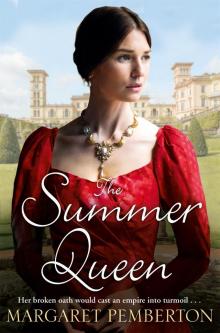 The Summer Queen
The Summer Queen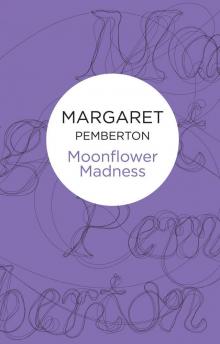 Moonflower Madness
Moonflower Madness The Londoners
The Londoners The Flower Garden
The Flower Garden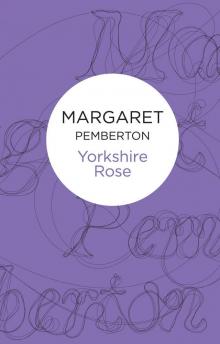 Yorkshire Rose
Yorkshire Rose Vengeance in the Sun
Vengeance in the Sun Zadruga
Zadruga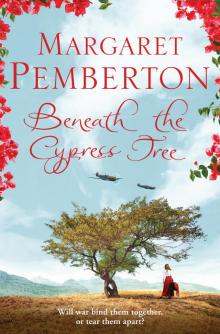 Beneath the Cypress Tree
Beneath the Cypress Tree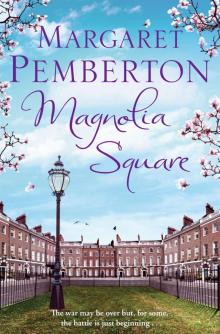 Magnolia Square
Magnolia Square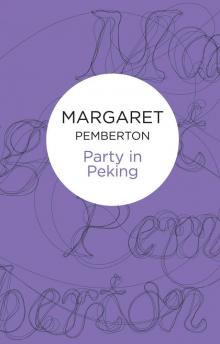 Party in Peking
Party in Peking Lion of Languedoc
Lion of Languedoc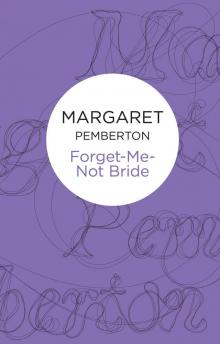 Forget-Me-Not Bride
Forget-Me-Not Bride The Guilty Secret
The Guilty Secret Rendezvous With Danger
Rendezvous With Danger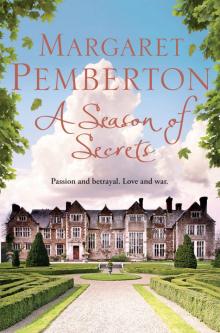 A Season of Secrets
A Season of Secrets Silver Shadows, Golden Dreams
Silver Shadows, Golden Dreams The Four of Us
The Four of Us Devil's Palace
Devil's Palace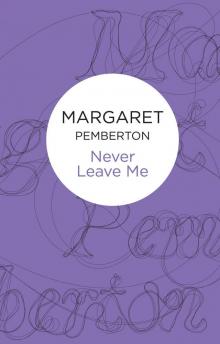 Never Leave Me
Never Leave Me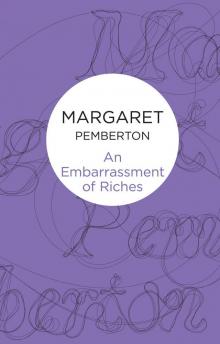 An Embarrassment of Riches
An Embarrassment of Riches African Enchantment
African Enchantment White Christmas in Saigon
White Christmas in Saigon Coronation Summer
Coronation Summer A Multitude of Sins
A Multitude of Sins Tapestry of Fear
Tapestry of Fear A Many-Splendoured Thing
A Many-Splendoured Thing